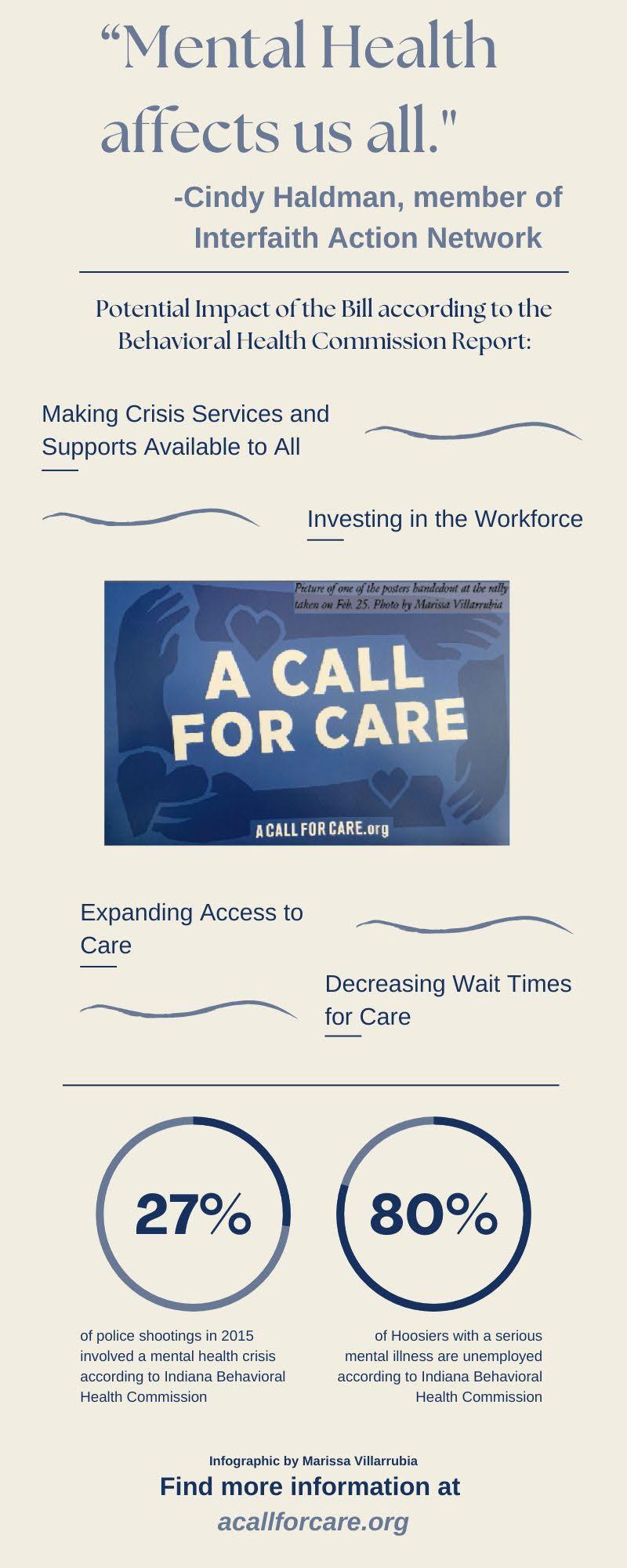
2 minute read
Rallying for Mental New bill for behavioral health receives support from Hoosiers
By Marissa Villarrubia, Staff
The annual cost of untreated mental illness in Indiana is estimated to be $4.2 billion, according to the Indiana Behavioral Health Commission.
Advertisement
A new bill called “Behavioral Health Matters” has three main goals; give people someone to contact, someone to respond, and a safe place for help. The bill, SB 1, will be voted on by April 27, which is the end of the legislative session. This bill will reform Indiana’s behavioral health system and provide people with trained, licensed professionals in their time of need.
The first goal of the commission is to give people someone to contact, a new 988 number is part of this goal. The number is meant to provide people in crisis with trained professionals to talk to and help create a comprehensive crisis response system.
Jodie Moser was at a rally for the bill on Feb. 11 to talk about her brother Adam, who struggled with mental illness, and how to fund 988.
“There are multiple possible funding streams for this. One of them is to fund crisis response like we fund 911 with a $1 a month user fee on phones that is just three cents a day,” Moser said. “Three cents a day so that my brother could have gotten the help he needed”
The last goal of SB one is to give people in crisis a safe place for help such as a Certified Community Behavioral Health Clinic (CCBHC). These places will exist instead of using jail or prison as a way to detain people in need of mental health care.
“These programs have consistently been shown to not just save money, but dramatically improve outcomes.” Moser said.
SB 1 only will essentially rebuild the entire crisis response model, which isn’t something that can be done overnight nor is it cheap.
“The clinician estimates the total cost to sustain those three things is $130.6 million a year,” Moser said. “That’s a lot of money, it’s 130 million. But when you consider untreated mental illness costs Indiana 4.2 billion, 130 million isn’t so much.”
Many people have been affected by the lack of funding for people in a mental health crisis. One of those people is disabled veteran Rick Moscrip, a Purple Heart recipient, who was also at the Feb. 11 rally. Moscrip described having thoughts of suicide one night, calling Veteran Affairs for help who then dispatched police to Moscrip’s home.
“My little ones, James was 13 years old, Joe was 10 and Alyssa was 4, watched as their daddy was walked out in handcuffs and taken from them,” Moscrip said. “ Just another crazy combat veteran, feeling stereotyped and ashamed along with the confusion of fear that my children experience added another layer of trauma to an already traumatized person.”
Bianaca Harris, licensed mental health therapist, highlights what kind of people are affected by SB 1.
“This is not a race issue. This is not a gender issue. This is not a faith issue. This is a mental health issue. If you are human, this is an issue for you,” Harris said.
The bill was initially authored at the beginning of 2023 but the issue it’s supporting has been around for years.
“Far too many Hoosiers find their destination to be a prison cell or pine box,” Moscrip said.
Despite this not being an easy process many people are committed to the cause and even plan on going to the legislative session which lasts from Jan. 9 until April 27 to advocate for Hoosiers across Indiana to get the help they deserve.
“We didn’t do this by ourselves,” Harris said. “This is a whole conglomeration of work, time, and investment across the state of Indiana.”
If you or someone you know is struggling with suicidal thoughts, call or text the U.S. National Suicide Prevention Lifeline at 988.










